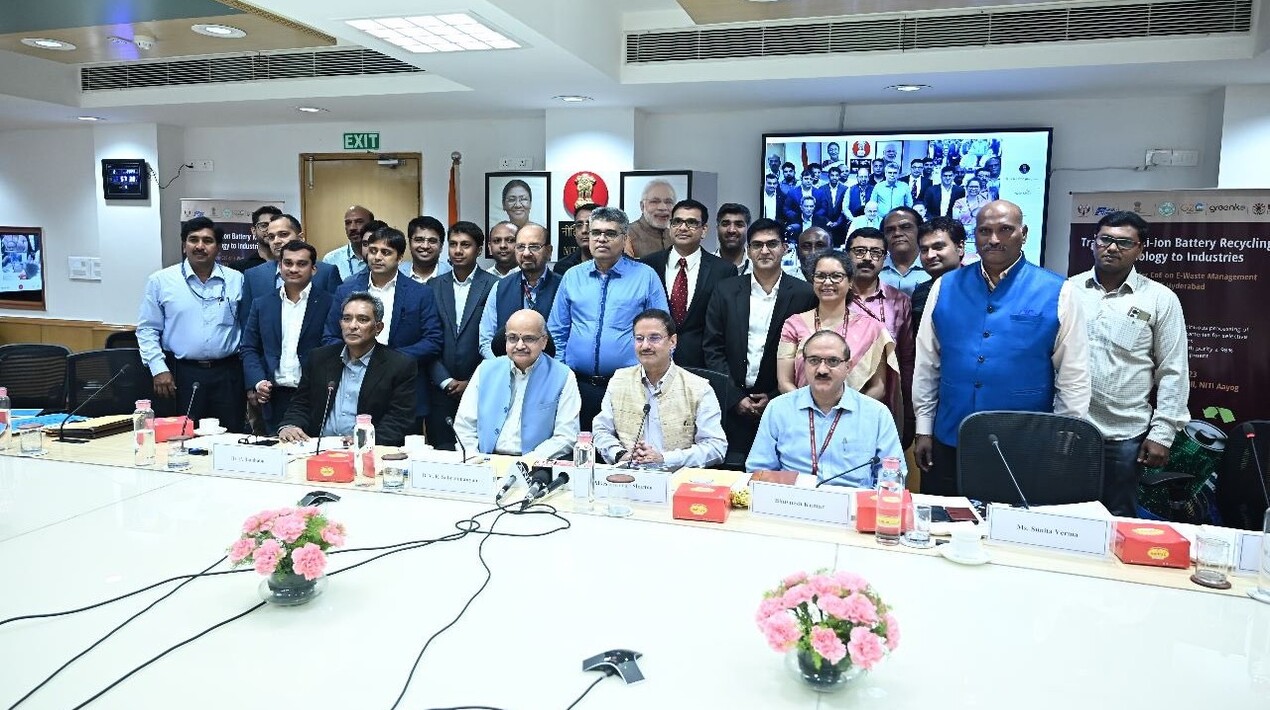
As part of the “Promote Circularity Campaign,” the Ministry of Electronics and Information Technology (MeitY) has transferred cost-effective Li-ion battery recycling technology to nine recycling industries and start-ups under the Mission LiFE initiative.
The novelty of the indigenously developed technology could process assorted types of discarded Li-ion batteries, recovering more than 95% lithium, cobalt, manganese, and nickel contents in the form of their corresponding oxides/carbonates of about 98% purity. The recycling procedure involves leaching followed by a hierarchical selective extraction of the metal values using a solvent extraction process. These secondary raw materials hold great potential for reuse in battery manufacturing or other potential applications.
This technology was developed by MeitY through the Centre of Excellence on E-waste Management established at the Centre for Materials for Electronics Technology (C-MET) in Hyderabad. The development took place in collaboration with the government of Telangana and an industry partner based in Hyderabad.
The CEO of the National Institute of Transforming India (NITI Aayog) highlighted the significance of the Centre of Excellence (CoE) model in promoting translational research and innovation through partnerships with the industry right from the problem-solving stage. The transfer of Li-ion battery recycling technology to nine local industries by MeitY demonstrates its commendable efforts in this regard, he said.
Out of the 11 chosen verticals of the circular economy by NITI Aayog, MeitY stands out as a frontrunner in showcasing the outcomes of technology development. This is particularly significant as the country is still limited in comparison to a few major economies in this domain. MeitY’s advancements in technology development within the circular economy demonstrate India’s commitment to embracing sustainable practices and contributing to global efforts in this field.
Alkesh Kumar Sharma, the Secretary of MeitY, expressed his appreciation for the Centre of Excellence (CoE) on E-waste Management at C-MET, Hyderabad, for their achievement in developing low-cost technology for local recycling industries and start-ups. He acknowledged the special efforts made by the government of Telangana and the private player in nurturing a unique concept in the country and facilitating translational research for commercialisation.
Furthermore, he commended the C-MET scientists for their venture into niche technology development, such as the production of hafnium metal sponge from effluents, a resource that is only available in a limited number of countries.
The initiative was launched under the Mission LiFE project. Mission LiFE (Lifestyle for Environment), envisioned by the Prime Minister at the Climate Change Conference (COP26), emphasises mindful and deliberate utilisation instead of mindless and wasteful consumption. More than 100,000 LiFE-related events have taken place across India mobilising over 1.7 million individuals to take pro-planet actions. These include cleanliness drives, bicycle rallies, plantation drives, LiFE marathons, plastic collection drives, composting workshops, and taking a LiFE pledge. Many schools and colleges are also undertaking cultural competitions such as street plays, essays, paintings, and youth parliaments.
Recently, under the project, the government has introduced the Electronics Repair Services Outsourcing (ERSO) Pilot initiative. It aims to validate certain transformational policy and process changes to make the country the repair capital of the world. By facilitating affordable and dependable repairs for ICT products on a global scale, the ERSO initiative will significantly contribute to extending the lifespan of devices worldwide.
















